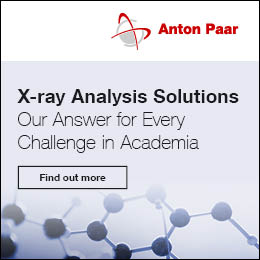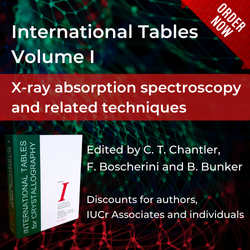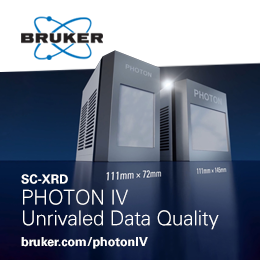


Meeting report (IUCr supported)
The VI Latin American Crystallographic Association Meeting
![thumbnail [thumbnail]](https://www.iucr.org/__data/assets/image/0019/160156/thumbnail.jpg)
Official event picture taken in the blue room at Montevideo's Municipal Building Conference Center.
The VI Latin American Crystallographic Association Meeting (LACA) and its satellite events took place in Montevideo, Uruguay, last September. After careful planning and setting of the goals for the event, which included transitioning to a meeting held in English and a strict gender equity and diversity statement to fulfill, the event was able to bring together 126 researchers from 21 countries in 3 continents (Argentina, Australia, Brazil, Canada, Chile, Colombia, Costa Rica, Cuba, Ecuador, France, Ireland, Mexico, Paraguay, Peru, Spain, Switzerland, United Kingdom, United States, Uruguay and Venezuela), who presented over 130 works.
Montevideo's municipal building, the School of Chemistry of the Universidad de la República and the Institut Pasteur of Montevideo were the chosen venues. From September 20th through to the 22nd, the VI LACA school was held, dedicated to an introduction to Quantum Crystallography for the first time in Latin America. With the help of Dr Christian Jelsch (CNRS) and Lorraine Malaspina (Bern University), together with Dr Bernardo Lages (UFMG) and Camila Batista (USP), 32 participants from 14 countries (Argentina, Brazil, Canada, Chile, Colombia, Costa Rica, Croatia, Ecuador, United States, France, Mexico, Peru, Switzerland and Uruguay), including researchers, graduate and undergraduate students, were introduced to the basics of Quantum Crystallography.
![[firstimage]](https://www.iucr.org/__data/assets/image/0020/160157/firstimage.jpg) Official VI LACA School picture. Top row, left to right: Víctor García, Elizabeth Olave, Maite Martirena, Robert Burrow, Nahum Ramírez, Ivanna Cabrera, Esteban Garcia, Juan Manuel Rey, Federico Mesa and Yonathan Parra. Second row, left to right: Mauricio Fuentealba, Vania Artigas, Bruna Santiago, Isadora Vieira, Rosario López, Tamara Quesada, Teresa Garcia, Manuel Vivas, Pedro Santiago, Jonathan Herrera, Michelle Herrera, Kersty Krupskava and Santiago Valiero. Third row, left to right: Silvina Pagola, Bernardo Rodrigues, Christian Jelsch, Santiago García-Granda, Camila Batista and Lorraine Malaspina. Bottom row, left to right: Santiago Pioli, Pollyana Firmino, Alessandra Costa, Lucas Machado, Pedro Marcon, Paulo de Souza and Hellen Guimarães.
Official VI LACA School picture. Top row, left to right: Víctor García, Elizabeth Olave, Maite Martirena, Robert Burrow, Nahum Ramírez, Ivanna Cabrera, Esteban Garcia, Juan Manuel Rey, Federico Mesa and Yonathan Parra. Second row, left to right: Mauricio Fuentealba, Vania Artigas, Bruna Santiago, Isadora Vieira, Rosario López, Tamara Quesada, Teresa Garcia, Manuel Vivas, Pedro Santiago, Jonathan Herrera, Michelle Herrera, Kersty Krupskava and Santiago Valiero. Third row, left to right: Silvina Pagola, Bernardo Rodrigues, Christian Jelsch, Santiago García-Granda, Camila Batista and Lorraine Malaspina. Bottom row, left to right: Santiago Pioli, Pollyana Firmino, Alessandra Costa, Lucas Machado, Pedro Marcon, Paulo de Souza and Hellen Guimarães.
Starting on September 23rd until the 26th, the venue moved from the School of Chemistry to Montevideo's Municipal Building Conference Center, where 126 researchers met to share their latest results and discuss the new frontiers in structural science. The VI LACA meeting was organized by Dr Natalia Alvarez (chair), Ivana Aguiar, Leopoldo Suescun and Daniel Ariosa from the Universidad de la República, and Dr Alejandro Buschiazzo, Felipe Trajtenberg and Nicole Larrieux from the Institut Pasteur de Montevideo. On the other hand, the international scientific committee was made up of researchers of different research interests considering the members of LACA and other countries that are keen to become members: Dr Valeria Fuertes and Dr Carlos López (Argentina), Dr Beatriz Guimarães and Dr Eduardo Granado (Brazil), Dr Mauricio Fuentealba (Chile), Dr Mario A. Macías (Colombia), Dr Bryan Moncada (Costa Rica), Lic. Ingrid Benítez (Guatemala), Dr María del Jesús Rosalez Hoz and Dr Vojtech Jancik (Mexico), Dr Natalia Alvarez and Dr Leopoldo Suescun (Uruguay), and Dr Alexander Briceño (Venezuela). The committee was specifically asked to come up with an exciting program for the meeting and the revision and edition of the book of abstracts available on the event's webpage (https://www.laca2024.pedeciba.edu.uy/).
The event was supported by the Universidad de la República, the Basic Sciences Development Program, the Institut Pasteur de Montevideo, the International Union of Crystallography (IUCr), the Latin American Crystallographic Association, the Structural Biology Center of Mercosur, the Uruguayan Network of Crystallography, Uruguay's Ministry of Tourism and the Municipal Government of Montevideo. The various institutions that provided financial support include: the International Union of Crystallography, the University of the Republic, the Basic Sciences Development Program, the Municipal Government of Montevideo, the International Center for Diffraction Data (ICDD), the Foundation for the Progress of Chemistry, Rigaku Inc., Bruker Inc., the Cambridge Crystallographic Data Center (CCDC), the Structural Biology Center of Mercosur and DECTRIS. All of whom made it possible for the event to be a success.
The event featured 3 plenary talks, 12 semi-plenary talks, 21 invited 20-minute talks, 8 selected 15-minute talks, 20 selected 10-minute talks, as well as 55 presentations in poster format divided into two sessions. The plenary lecturers Professor Michael Zawarotko from the University of Limerick, Ireland; Professor Richard Garrat from the University of São Paulo, Brazil, and Professor Louise Dawe from Wilfrid Laurier University, Canada, ensured the discussion of different and exciting topics. Keynote lecturers included: Professor Santiago Garcia-Granda, Universidad de Oviedo and the IUCr; Robert Hanson, St Olaf College (USA); Julia Torres, Universidad de la República (Uruguay); Silvina Pagola, Old Dominion University (USA); Andrey Nascimento, Sirius, LNLS (Brazil); Alejandro Buschiazzo, Institut Pasteur de Montevideo (Uruguay); Maria Cristina Nonato, São Paulo University (Brazil); Gabriela Aurelio, Laboratorio Argentino de Haces de Neutrones (Argentina); Florencia di Salvo, Universidad de Buenos Aires (Argentina); Peter Spackman, Curtin University (Australia); Nikolay Gerasimchuk, Missouri State University (USA); and Javier Ellena, São Paulo University (Brazil). Sessions concerning Crystal Engineering, the characterization of minerals, X-ray technique applications in heritage and industry applications, medicinal chemistry, SAXS, Neutron and synchrotron radiation, functional materials, structural biology, and Crystallographic Education and Engagement took place during the event.
IUCr president Santiago Garcia-Granda, vice-president Graciela Díaz de Delgado, and executive community member and LACA liaison Cristina Nonato were available, and had a great opportunity to share ideas and discussions. Several IUCr journal co-editors were also present, and most of them were involved in the evaluation of the young researcher presentation IUCr prizes and participated in lively discussions. Co-editors present at LACA2024 included Michael Zawarotko (IUCrJ); Louise Dawe (Acta B); Florencia di Salvo, Nikolay Gerasimchuk and María del Jesús Rosales Hoz (Acta C); Richard Garrat (Acta D); Graciela Díaz de Delgado, Natalia Alvarez, Alexander Briceño, Miguel Delgado, Florencia di Salvo, Javier Ellena, Vojtech Jancik and Leopoldo Suescun (Acta E); and Cristina Nonato and Alejandro Buschiazzo (Acta F). The meeting also had Professor Rosales Hoz's presentation of the Acta C Special Issue - Crystallography in Latin America: a vibrant community.
The main goal of the meeting was to help as many young researchers as possible and we are proud to share that the VI LACA meeting was able to support 29 young researchers through travel bursaries sponsored by the IUCr, the ICDD and the CCDC, coupled with the allocation of 23% of the funds received from registration fees to this end.
![[secondimage]](https://www.iucr.org/__data/assets/image/0003/160158/secondimage.jpg) VI LACA meeting and school bursary recipients. First row, left to right: Elizabeth Olave, Paulo Nunes, Lucas Machado, Pedro Salgado, Pollyana Firmino, Gabriel Pessoa, Sergio Rincón, Juan Rey, Kevin Salamanca, Esteban Garcia and Zaighum Abbas. Middle row, left to right: Kristal Varela, Bruna Rotta, Ivanna Cabrera, Teresa Garcia, Tamara Quesada, Rosario López, Manuel Vivas and Mauro Difeo. Bottom row, left to right: Kersty Barrios, Paulina Rossi, Michelle Herrera, Ely Sepúlveda and Hellen Guimarães. Absent from the photo: Ivan Polcowñuk, Micaela Campo, Esteban Asto, Belén Arcentales and Mayra Padrón.
VI LACA meeting and school bursary recipients. First row, left to right: Elizabeth Olave, Paulo Nunes, Lucas Machado, Pedro Salgado, Pollyana Firmino, Gabriel Pessoa, Sergio Rincón, Juan Rey, Kevin Salamanca, Esteban Garcia and Zaighum Abbas. Middle row, left to right: Kristal Varela, Bruna Rotta, Ivanna Cabrera, Teresa Garcia, Tamara Quesada, Rosario López, Manuel Vivas and Mauro Difeo. Bottom row, left to right: Kersty Barrios, Paulina Rossi, Michelle Herrera, Ely Sepúlveda and Hellen Guimarães. Absent from the photo: Ivan Polcowñuk, Micaela Campo, Esteban Asto, Belén Arcentales and Mayra Padrón.
Several prizes were awarded by the end of the meeting to young researchers who presented outstanding works in different areas of structural sciences. IUCr prizes were awarded to Joaquín Dalla Rizza from the Institut Pasteur de Montevideo, Hellen Ferreira Guimarães from the Universidade Federal de Minas Gerais and Esteban Garcia from the University of Manitoba in Structural Biology, Structural Chemistry and Applied Crystallography, respectively.
![[thirdimage]](https://www.iucr.org/__data/assets/image/0004/160159/thirdimage.jpg) IUCr prizes delivered at the closing ceremony of LACA2024. From left to right: Dr Alejandro Buschiazzo delivering the Structural Biology Prize to Joaquín Dalla Rizza, IUCr vice-president Professor Graciela Díaz de Delgado delivering the Structural Chemistry prize to Hellen Ferreira Guimarães and IUCr president Professor Santiago Garcia-Granda delivering the Applied Crystallography prize to Esteban Garcia.
IUCr prizes delivered at the closing ceremony of LACA2024. From left to right: Dr Alejandro Buschiazzo delivering the Structural Biology Prize to Joaquín Dalla Rizza, IUCr vice-president Professor Graciela Díaz de Delgado delivering the Structural Chemistry prize to Hellen Ferreira Guimarães and IUCr president Professor Santiago Garcia-Granda delivering the Applied Crystallography prize to Esteban Garcia.
The CCDC sponsored two prizes delivered to Ely Sepúlveda from the Universidad Industrial de Santander and Juan Manuel Rey from the Universidad de Buenos Aires.
![[fourthimage]](https://www.iucr.org/__data/assets/image/0014/160160/fourthimage.jpg) CCDC prizes delivered to Ely Sepúlveda by CCDC champion Professor Javier Ellena (left) and Juan Manuel Rey by CCDC champion Professor Natalia Alvarez (right).
CCDC prizes delivered to Ely Sepúlveda by CCDC champion Professor Javier Ellena (left) and Juan Manuel Rey by CCDC champion Professor Natalia Alvarez (right).
The Protein Data Bank (PDB) also sponsored a prize that went to Zaighum Abbas from the Universidade de São Paulo. The last prize, sponsored by the ICDD, was awarded to Manuel Vivas from the Universidad de Córdoba.
![[fifthimage]](https://www.iucr.org/__data/assets/image/0015/160161/fifthimage.jpg) Zaighum Abbas receiving the PDB prize from Dr Alejandro Buschiazzo (left). Manuel Vivas receiving the ICDD prize from ICDD representatives Miguel Delgado and Leopoldo Suescun (right).
Zaighum Abbas receiving the PDB prize from Dr Alejandro Buschiazzo (left). Manuel Vivas receiving the ICDD prize from ICDD representatives Miguel Delgado and Leopoldo Suescun (right).
On Friday September 27th, three parallel satellite workshops took place dedicated to the use of CCP4 software, CCDC tools and the ICDD PDF5+ database. The CCP4 workshop was ministered by Charles Ballard, Robert Nicholls and Lucrezia Catapano. The CCDC workshop was ministered by Florencia di Salvo, Javier Ellena and Natalia Alvarez, with the online participation of Andrew Peel, Ilaria Gimondi and Yinka Olatunji-Ojo. The ICDD workshop was ministered on site by Graciela Díaz de Delgado, Miguel Delgado and Leopoldo Suescun, and had the online participation of Thomas Blanton.
Not all of it was science and seriousness: relaxed times were shared in watching the sunset from the panoramic viewpoint at the top of the Municipal building, pizzas and beers were enjoyed at The End Bar for the welcoming cocktail, and lets not forget the amazing conference dinner at El Milongón where after one hour of an artistic show portraying local dances and music we enjoyed dancing until hours that I will not confess. The excitement and commitment of the participants was such that the room for the last keynote lectures the next morning was at the same capacity as the previous mornings.
All in all, we are confident that several interesting science discussions took place and new collaborations were established, including crazy plans such as a regional crystal growing competition that may take place this year. We were honored to host the meeting, are thankful to all participants for their role in making this a success and hope to meet you all soon at the VII LACA meeting to be held in Fortaleza, Brazil, in October.
Copyright © - All Rights Reserved - International Union of Crystallography




